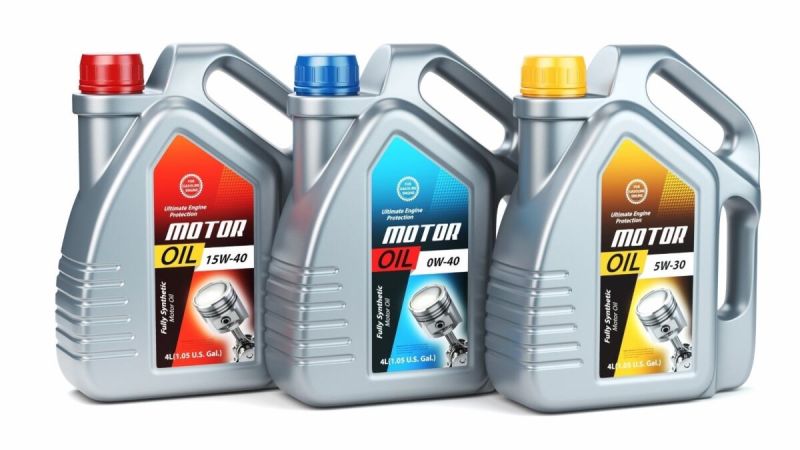Many new models such as those from Toyota have made a switch to thinner motor oils. Rather than the typical SAE 10W-30 you likely had been using for years, the newer vehicles are arriving on dealership lots with SAE 0W-16 oil, which has a significantly lowered viscosity; or, to put it another way---is a thinner oil.
But is this a good thing?
Related article: New Toyota Brought in Garage After Only 900 Miles! Why?
Oil Viscosity Basics
Oil in your engine serves two primary functions: (1) Lubricating the moving parts to reduce friction by providing a thin film between the rubbing parts. (2) Oil helps cool the engine, which is one of several reasons why you should change your oil more frequently than your owner’s manual recommends because a cleaner oil is a cooler oil.
When it comes to the viscosity of oil, all you have to do is take note of the alpha-numeric code plainly visible on your oil can where you will see coding such as 10W-30, 20W-40, 5W-30, etc., as examples you are used to seeing.
This code was created by the Society of Automotive Engineers (SAE) as a viscosity grading system to designate the differences between single-grade (like the “SAE-30” you see on your lawn mower motor oil bottle) and multi-grade (“SAE 10W-30” on your car’s motor oil bottle) motor oils.
It helps to think of viscosity as like comparing a cup of Coca Cola with a cup of maple syrup. Both are a syrupy liquid, yet the Coca Cola pours very easily at room temperature, whereas the maple syrup will pour slightly slower.
Lower the temperature outside to cooler temperatures and the Coca Cola will still pour just as quickly, but the maple syrup will pour much slower under these conditions because it is more viscous at a lower temperature. Put it another way, viscosity is the resistance of a fluid to flow, and it is typically temperature dependent.
What this has to do with motor oil is that a code like 10W-30 (of which the “W” stands for “Winter” and not “Weight” as is often mistaken) is that the number to the left of the “W” is a graded scale of viscosity for the cooler range of temperatures, whereas the number to the right of the “W” following the hyphen is the viscosity scale for a warmer temperature range that is assigned with this particular multi-grade motor oil.
The reason for this multi-grade viscosity nomenclature is that now motor oils come in multi-grade formulations so that you do not have to switch from a single grade lower viscosity oil for wintertime to a single grade higher viscosity oil in the summertime. Kind of like having all-season tires as opposed to the days of switching out summer and winter tires back in the day.
A Recent Thinner and Thicker Motor Oil Review
As mentioned earlier, modern models of Toyota have switched to an overall thinner oil designated by the SAE code as SAE 0W-16. Notice that this means the oil is less viscous in both its cooler and warmer temperature designations, so it is a thinner oil overall.
In a recent Project Farm YouTube channel episode, the host did a demonstration comparing thinner and thicker motor oils using a variety of tests that basically showed the newer SAE 0W-16 oil is less viscous than the older SAE 10W-40 oil regardless of the temperatures used, whether the oil heated or not, and whether there is any difference when it comes to each oil types ability to protect metal surfaces from wear when rubbing against each other.
In other words, while interesting to watch, it did not provide any new information that was applicable to car engines and the oil we use today as compared to yesterday. If viewers were expecting to see evidence that thinner oils are actually worse for cars, they would be sorely disappointed.
To the host’s credit at the end of the video he recommended that car owners should always use the engine oil grade recommended by the manufacturer.
Here is the video posted below that is worth watching as it demonstrates the concept of viscosity very well to give you a visual of how different oil grades physically differ. However, below the video find out what thinner oil warning you need to know and why.
Will Thin Motor Oil Cause Engine Damage? Let's Settle This!
Thinner Oil Warning
The warning that car owners need to know is that with modern cars that have the thinner oil recommendation, is that you really need to stick with the manufacturer’s recommendations.
While it might be tempting to use the older more viscous grade of oil you are used to because you feel like it might help prevent oil leaks and/or you are convinced that the overall higher viscosity of a 10W-40 oil will lubricate the moving parts within an engine better---you would be wrong. In fact, you will likely be causing damage to your car’s engine using any oil rather than that recommended by the car’s manufacturer.
The reason for this has to do with viscosity and changing engine design.
Your newer model engine is physically designed to handle a thinner oil that can be adversely affected using a thicker oil such as:
- Tolerances between moving parts may be narrower or tighter---squeezing a thick oil film into a thinner tolerance can affect the actual lubrication.
- Oil passages likewise may differ in size to affect the flow and thus internal oil pressures within the engine.
- The oil pump(s) may be designed to handle a specific viscosity grade.
- Some models may have internal oil cooling units to further control viscosity within the engine during differing times of operation and conditions.
- The thinner oil may have different additives the engine needs to operate that the thicker oil might not possess.
In short, a thicker oil can potentially harm an engine designed to operate with a thinner oil. So, don’t do it.
For additional oil-related articles, here are three for your consideration:
- Ford EcoBoost Engine Oil Breakdown Problem
- Why Toyotas Burn So Much Oil and What You Can Do About It
- Fake Oil Filter Caused Toyota Engine Damage
Timothy Boyer is a Torque News automotive reporter based in Cincinnati. Experienced with early car restorations, he regularly restores older vehicles with engine modifications for improved performance. Follow Tim on Twitter at @TimBoyerWrites for daily new and used vehicle news.
COMING UP NEXT: 5 Car Myths You Actually Can Fall for But Won’t After This
Image Source: Deposit Photos
Set Torque News as Preferred Source on Google












Comments
Wow, I guess you didn't…
Permalink
Wow, I guess you didn't watch the video did you? Projectfarms did in fact show that thinner oil does NOT protect as well as 5w30 in the Lubricity bearing test. The damaged area was bigger on 0W16, so that thinner oil failed to provide the protection needed.